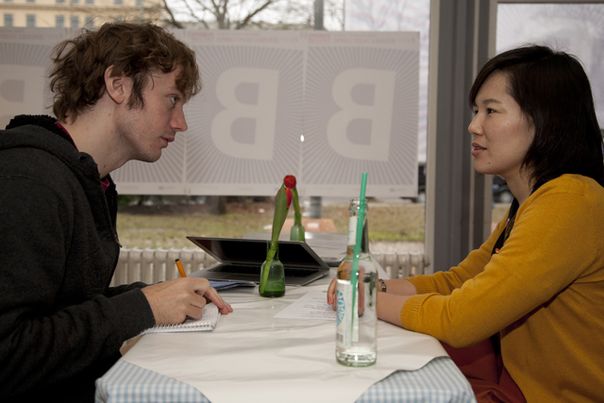Rooted and Uprooted
A conversation with director Kyoko Miyake about her Berlin Today Award winning HACKNEY LULLABIES.

Director Kyoko Miyake
Kyoko Miyake initially moved to the UK from Japan to study history. Today she sees certain parallels between her academic work and her films. “When I studied history, I was reading documents about the everyday lives of ordinary people. Not big political movements, but things like diaries of prisoners and witchcraft accusations, which offer a glimpse into the everyday world of people in history.” Miyake’s film HACKNEY LULLABIES demonstrates a similar curiosity about people’s day-to-day experience. A documentary about migrant women raising children in the East London suburb of Hackney, Miyake’s film interweaves the different stories it tells much as a researcher pieces together a series of historical documents into a narrative.
A member of the 2010 Campus, Miyake returns to the Berlinale as the winner of the Berlin Today Award, a programme that sponsors films by previous Campus participants. HACKNEY LULLABIES was inspired by the making of Miyake’s previous film, MRS. BURNS’ SUNDAY ROAST. That film's protagonist, a Japanese food writer living in England, told Miyake about her experience raising a child there. "She wanted to raise her daughter as English, and sing her English nursery rhymes, but then quickly realised that she didn't know any. That made her sad, to have to acknowledge that she could never fully adapt. So that’s how I became interested in the topic."
HACKNEY LULLABIES develops this initial idea into an intimate account of the difficulties mothers face raising children in a new country. The women in Miyake's film are sensitive to these difficulties, while appreciating the opportunities their children will have in their new country. The songs the mothers sing to their kids act as a soundtrack that also links these families and their different stories together. Quite poignantly, the lullabies sung by the women in their native languages point to the difficulties they will face maintaining cultural connections to their children as they grow older.
Miyake considers her participation in the Campus to have helped her greatly as a filmmaker. "I didn't go to a film school. I felt quite isolated, writing script synopses without being able to show them to anybody. Now I know a lot of people in a similar situation who I'm able to discuss and exchange ideas with." Miyake’s time at the Berlinale Talent Campus in 2010 made this experience of being part of a community of filmmakers possible for her. HACKNEY LULLABIES demonstrates a strong working relationship between Miyake and the filmmaking team she was brought together with by the programme. The intimacy Miyake is able to achieve in her interviews is enhanced further by the remarkable editing work of Sirko Knüpfer, moving deftly between interviews and candid scenes of mothers and children at play. In its touching exploration of an often overlooked subject, HACKNEY LULLABIES is the work of a young filmmaker with a strongly developing, original voice.


301 Moved Permanently